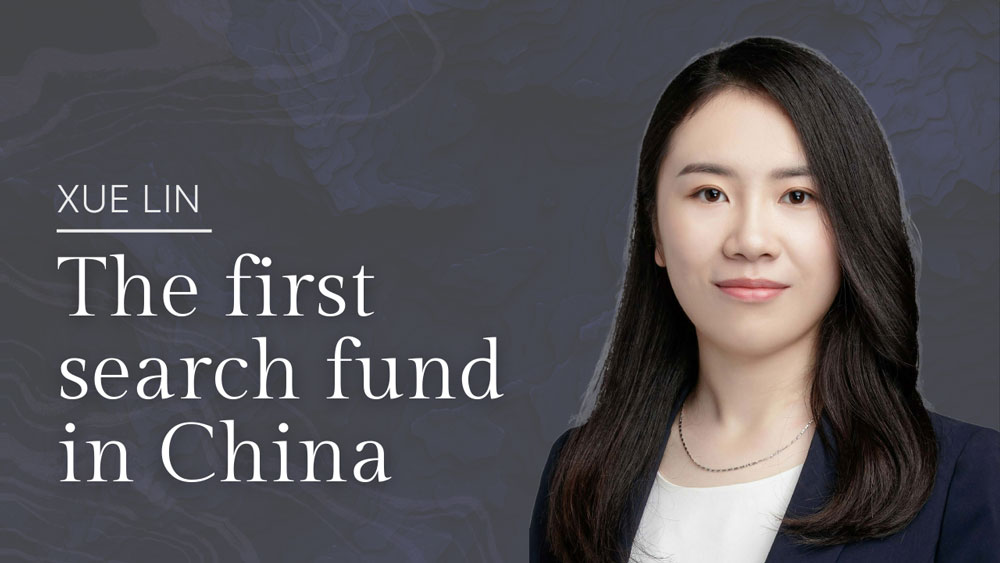Amy Dunn Moscoso
5
min read
China’s First Search Fund With Xue Lin
Xue Lin
Founder | Prospect Search Capital
Key Takeaways
When Xue Lin, a management student at Fudan University and the Yale School of Management, saw the IESE 2022 search fund study report, China had not one search fund despite being the second venture capital/private equity market
Aging business owners struggled to sell businesses to fund retirement without means such as search funds to match them with buyers
In 2024, Xue Lin launched Prospect Search Capital, China’s first search fund
She hopes the search fund supplies retirement revenue to retiring Baby Boomer business owners, and entrepreneurial opportunities to young people
“Entrepreneurial strategy and decision-making are more future-centric, looking forward, not looking backward. I was very convinced that I want to be future-centric.”
As the daughter of a factory owner who was looking to retire, Xue Lin knew how challenging it could be to sell a business, even a successful one, without the means to secure a buyer. This made it tough for business owners like Xue’s father to retire. At the same time, many educated young people were looking to acquire established businesses. However, sellers and buyers struggled to find one another through search funds. Many businesses are expected to be impacted as Chinese Baby Boomers age.
The Search Fund Solution
Xue found a potential solution to transferring businesses as a management student at Fudan University and Yale School of Management in the United States. A Yale professor named AJ Wasserstein introduced her to search funds, which help unite business sellers with buyers. When Xue looked at the IESE 2022 search fund study report, she saw that many Asian countries, including Japan and Vietnam, having flags denoting search fund representation. China was grey. The country had not one search fund. China was the world’s second-largest venture capital/private equity market. Xue wondered: Why did China not have a search fund?
Baby Boomer Chinese Entrepreneurs Seeking Retirement Revenue
To understand why, Xue looked back at the recent business history in China. Chinese Baby Boomers boomed in the 1960s, 265 million people were born during those ten years, coupled with China's 1978 open-door policy. As these business owners retire in their 60s, the 2020s make for a perfect decade for introducing search funds in the country.
The Search Fund model will be adopted differently across China, as there are varying levels of business maturity. Xue launched in the Yangzi River Delta, the most promising economic area near Shanghai. “My hometown Wenzhou is very active with entrepreneurs. It is a great start for the birth of Search Fund. Also, Jiangsu and Zhejiang Province are the most active areas of SME and private capital. This geographic also triggered faster introducing of Search Fund.” she says. “With more entrepreneurs seeking retirement and young people being well educated and encouraged to go entrepreneurial path, the need for search funds will bloom,” she says.
Advantages of East and West
Having spent a year studying at Yale School of Management in the United States, Xue drew on the advantages of American and Chinese business cultures."One of the things worth promoting about American culture is its encouragement of inexperienced individuals to try and grow, offering young first-time CEOs more opportunities," she says. "In China or Japan, people weigh a lot more on seniority and past experience," Xue remarks.
On the other hand, China has the advantage that its people generally work harder. China has gone through a lot of suffering in the past century. It took two generations of self-made people and day and night hard work to catch up with the world powers in 70 years. "China has had this internal energy of hard work since ancient times," she said. "This provides a solid background for entrepreneurship and future growth."
Xue also observed cultural differences between universities in the East and the West that helped her along the way. There was a focus on 'listening' at Fudan and 'speaking and standing out' at Yale. Xue found speaking skills particularly helpful in fundraising, as searchers need to pitch to different investors. Yale transformed her to be more bold. "At the same time, listening always keeps you humble and fosters the mindset of a true entrepreneur,” she says. These skillsets were invaluable. “We need to find the balance between them,” Xue shares.
"I remember Ray Dalio, the founder of Bridgewater, saying that in 5,000 years, China has fallen and returned seven times to be the most prosperous country in the world. There must be some momentum and necessity in this cycle that will bring it back to glory." Xue found this historical context exciting in the early stages of building the search fund. “China is in a rising stage.”
Building a Community of Entrepreneurs
A lot of potential searchers have communicated with Xue. “I find it easy to promote search fund to ambitious young people who want to start an entrepreneurial path.” Those who want stable jobs in large tech firms may have a tough time making the switch. Xue’s love of entrepreneurship was born through undergraduate experiences before her MBA. She spent four years helping local craftsmen sell handmade lanterns “to improve their income and social status.” She loved it. “I really enjoy the operational and entrepreneurial side of things while helping others,” Xue says.
Focusing on the Future Versus the Past
Xue's formerly worked as an auditor, where the focus was on historical data to ensure the accurate presentation of financial statements. However, Xue shared that she wanted to shift her focus towards the future. “Entrepreneurial strategy and decision-making are more future-centric, looking ahead rather than backward. I aspire to adopt a more forward-thinking career,” she said. During time at Fudan, Xue participated in startup competitions that aimed to address waste problems in packaging. “China's weekly usage of boxes in double 11 equals the annual usage in Europe,” she explains. “It's incredibly wasteful, and I'd much rather be involved in solving future problems like this, reducing carbon emissions etc."
Building from a Banking Background
Xue's experience as a former auditor has provided her with solid banking expertise. This helps in the later stages of the search fund's acquisition activity because debt is one of the 3 most important factors besides the person (searcher) and the target (business owner who intends to sell). And debt involves the complexity of the transaction. "The degree of leverage and debt are crucial in leveraged buyouts," Xue said. At present, China's 1Y-5Y LPR has been decreasing from 3.65%-4.30% to 3.45%-3.95%, which is in complete contrast to the debt cost of the United States, which is as high as about 10%. The current debt market and buyer's market are very favorable to China.
Building the search fund capital table has included both foreign and local sources, with 65 percent being international and 35 percent from China. “l want to thank the first searcher in Ireland, Sam Batran,” Xue says. “He shared a lot of experience with me how to facilitate the progress and make the pioneer exploration more practical.”
Looking Ahead: Modernization and Globalization of Small and Medium Chinese Enterprises
Xue says that modernization requires an educated workforce. While China has the largest post-secondary market in the world, and younger people are gaining more education, 37% of people aged 25-67 had completed high school in 2020. Globalization requires English speakers and those who can trade in a foreign market. “It’s about people and new CEOs or new searchers to take over the traditional roles,” she says.
Having put China on the map of search funds, Xue is now focused on building her community. Learn more at Prospect Search Capital.



